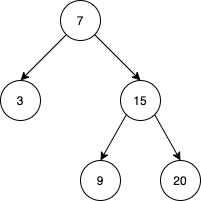Implement the BSTIterator class that represents an iterator over the in-order traversal of a binary search tree (BST):
BSTIterator(TreeNode root)Initializes an object of theBSTIteratorclass. Therootof the BST is given as part of the constructor. The pointer should be initialized to a non-existent number smaller than any element in the BST.boolean hasNext()Returnstrueif there exists a number in the traversal to the right of the pointer, otherwise returnsfalse.int next()Moves the pointer to the right, then returns the number at the pointer.boolean hasPrev()Returnstrueif there exists a number in the traversal to the left of the pointer, otherwise returnsfalse.int prev()Moves the pointer to the left, then returns the number at the pointer.
Notice that by initializing the pointer to a non-existent smallest number, the first call to next() will return the smallest element in the BST.
You may assume that next() and prev() calls will always be valid. That is, there will be at least a next/previous number in the in-order traversal when next()/prev() is called.
Example 1:
Input ["BSTIterator", "next", "next", "prev", "next", "hasNext", "next", "next", "next", "hasNext", "hasPrev", "prev", "prev"] [[[7, 3, 15, null, null, 9, 20]], [null], [null], [null], [null], [null], [null], [null], [null], [null], [null], [null], [null]] Output [null, 3, 7, 3, 7, true, 9, 15, 20, false, true, 15, 9] Explanation // The underlined element is where the pointer currently is. BSTIterator bSTIterator = new BSTIterator([7, 3, 15, null, null, 9, 20]); // state is [3, 7, 9, 15, 20] bSTIterator.next(); // state becomes [3, 7, 9, 15, 20], return 3 bSTIterator.next(); // state becomes [3, 7, 9, 15, 20], return 7 bSTIterator.prev(); // state becomes [3, 7, 9, 15, 20], return 3 bSTIterator.next(); // state becomes [3, 7, 9, 15, 20], return 7 bSTIterator.hasNext(); // return true bSTIterator.next(); // state becomes [3, 7, 9, 15, 20], return 9 bSTIterator.next(); // state becomes [3, 7, 9, 15, 20], return 15 bSTIterator.next(); // state becomes [3, 7, 9, 15, 20], return 20 bSTIterator.hasNext(); // return false bSTIterator.hasPrev(); // return true bSTIterator.prev(); // state becomes [3, 7, 9, 15, 20], return 15 bSTIterator.prev(); // state becomes [3, 7, 9, 15, 20], return 9
Constraints:
- The number of nodes in the tree is in the range
[1, 105]. 0 <= Node.val <= 106- At most
105calls will be made tohasNext,next,hasPrev, andprev.
Follow up: Could you solve the problem without precalculating the values of the tree?
Companies:
Facebook
Related Topics:
Stack, Tree, Design, Binary Search Tree, Binary Tree, Iterator
Similar Questions:
// OJ: https://leetcode.com/problems/binary-search-tree-iterator-ii/
// Author: github.com/lzl124631x
// Time:
// BSTIterator: O(H)
// hasNext: O(1)
// next: amortized O(1)
// hasPrev: O(1)
// prev: O(1)
// Space: O(N)
class BSTIterator {
vector<int> seen;
int i = -1;
stack<TreeNode*> s;
void pushNodes(TreeNode *root) {
while (root) {
s.push(root);
root = root->left;
}
}
public:
BSTIterator(TreeNode* root) {
pushNodes(root);
}
bool hasNext() {
return i < seen.size() - 1 || s.size();
}
int next() {
++i;
if (i == seen.size()) {
auto node = s.top();
s.pop();
seen.push_back(node->val);
pushNodes(node->right);
return node->val;
}
return seen[i];
}
bool hasPrev() {
return i > 0;
}
int prev() {
return seen[--i];
}
};